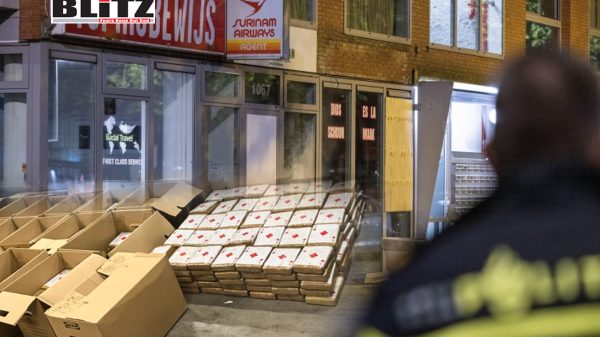Inside the Netherland’s data black market fueling explosions and organized crime violence
- Update Time : Monday, October 20, 2025

In recent years, the Netherlands – long known for its progressive policies, efficient governance, and secure digital infrastructure – has found itself facing a new and deeply troubling form of organized crime. What began as a simple act of corruption – a government employee leaking personal information – has escalated into a national security nightmare. Prosecutors now allege that stolen data from Dutch government systems has been weaponized by criminals, helping trigger a surge of shootings and bombings across the country.
At the center of this unfolding scandal is a shocking case: a city clerk accused of selling sensitive information from Amsterdam’s municipal databases to data brokers, who in turn supplied it to organized crime groups. The case has revealed the disturbing emergence of a “shadow market” for stolen personal data – and the horrifying violence that can result when government information falls into the wrong hands.
The story began with what seemed like an innocuous text message: “Call me tomorrow, I will bring you the porridge.” It was sent in July 2024 to Jim B., a 47-year-old civil servant working in Amsterdam’s debt collection department. But the message wasn’t about breakfast – it was code for money.
The sender, prosecutors allege, was 41-year-old Rishi K., a self-styled “information broker.” Acting as a middleman between government insiders and the criminal underworld, he allegedly paid Jim B. for access to personal data – home addresses, license plate numbers, and other sensitive information. According to the Dutch Public Prosecutor’s Office, Jim B. illegally accessed the records of more than 2,600 citizens. Many of those data lookups, investigators claim, were followed by violent attacks – including shootings and explosions.
In total, Jim B. is accused of earning over €100,000 from the sale of personal information. Rishi K., for his part, allegedly paid him about €50 for each query and sold the data on to unknown buyers for up to ten times that amount.
The information was drawn from the Personal Records Database, which contains detailed personal information on every Dutch citizen and legal resident. In the wrong hands, such information is gold – it allows criminals to locate rivals, intimidate witnesses, and target individuals involved in drug feuds.
The case, now being tried at the Amsterdam District Court, is the first in Dutch history where a government employee has been charged with complicity in a wave of violent crimes stemming from data leaks.
To understand the gravity of this case, one must grasp the broader context: the Netherlands is in the grip of a violent crime wave unlike anything in its recent history. Over the past two years, there have been more than 1,500 bombings or attempted bombings across the country – a staggering 71 percent increase compared to 2023.
Most of these attacks are tied to conflicts between rival drug gangs, particularly in major cities such as Rotterdam, Amsterdam, and The Hague. The Netherlands, and especially its ports, has become a key European hub for cocaine trafficking. With billions in illicit profits at stake, violent score-settling has become routine – and now, thanks to stolen government data, increasingly precise.
According to investigators, the information leaked by Jim B. was linked to at least six violent incidents in different Dutch cities between October 2024 and May 2025. Two houses he looked up were later bombed, and data from his searches corresponded to addresses where shootings occurred.
One explosion in particular illustrates the human cost of this underground data economy.
Mary and Paul, a married couple in their 60s, were sleeping in their small apartment in a working-class neighborhood when a bomb detonated outside their door. The blast ripped their front door off its hinges and scorched their bedroom walls. Though they survived, the experience left them traumatized. Police later concluded that the target was their neighbor – and that the attack was linked to information allegedly sold by Jim B.
“I am still stressed when I think about it,” Mary said. “It is super-dangerous. It happened so close to our door. It could happen anywhere.”
According to experts, this scandal is not an isolated event but part of a growing phenomenon across Europe. As organized crime becomes more professionalized, a new class of “brokers” has emerged – individuals who specialize in obtaining and selling information rather than committing violence themselves.
“Never before has organized crime had so much venture capital available to invest in corruption,” said Daniel Brombacher of the Global Initiative Against Transnational Organized Crime. “We’re now seeing a brokerage culture, where information is traded as a commodity, enabling others to act violently.”
These brokers, Brombacher explained, often rely on social engineering – identifying and exploiting vulnerable government workers. Some are lured by money, others by personal favors or romantic manipulation. Once a relationship is established, brokers pay them to conduct data lookups on “subjects” – often without the civil servants realizing how their actions will be used.
Jeanine Kooistra, head of the Dutch National Criminal Investigation Department, described the growing challenge law enforcement faces. “There’s a direct correlation between data leaks and violent attacks,” she said. “Brokers have built networks of insiders with access to sensitive systems. They know exactly who to target and how to recruit them.”
A single address or license plate can sell for as little as €50, but in the criminal economy, that information can be worth a life – literally.
Investigators found that Jim B. and Rishi K. communicated through encrypted apps such as Signal and used services like Privnotes, which allow messages to self-destruct after being read. These tools helped the pair conceal their activities and erase evidence.
When police raided Jim B.’s home, they found two smartphones and a handwritten note listing “outstanding amounts” and “number of subjects: 2625.” Prosecutors say the note is effectively an account ledger of his illegal business – a paper trail linking him to a network of violent criminals.
When questioned by investigators, Jim B. reportedly said: “I felt trapped in a web from which I could no longer escape.” He admitted that he knew the information he provided might be used for violent crimes but continued because of the pressure and money involved.
For many Dutch citizens, this case has shaken confidence in the state’s ability to protect their personal data. The Netherlands has long prided itself on its secure digital infrastructure and open governance systems, but this scandal reveals that even robust institutions can be vulnerable to human corruption.
The revelation that a trusted municipal worker could play a role – however indirect – in bombings and assassinations has horrified the public and demoralized civil servants. “His department head and team manager call him a dedicated and loyal employee,” prosecutors noted. “His colleagues were in tears because they couldn’t believe it.”
The Amsterdam municipality has so far declined to comment, citing the ongoing trial. But internal sources say the case has triggered sweeping reviews of data access protocols across multiple departments.
What makes the Dutch situation particularly dangerous is the convergence of two trends: a booming drug trade and easy access to digital information. With Europe now consuming more cocaine than ever before, vast criminal profits are being funneled into logistics, recruitment, and corruption.
Ports like Rotterdam and Antwerp have become battlegrounds, as gangs fight over control of smuggling routes. Intelligence leaks – whether from police, customs officers, or municipal employees – can make the difference between a successful shipment and a million-euro loss.
“The scale of corruption is unprecedented,” said Brombacher. “Organized crime no longer relies on brute force alone; it relies on data, logistics, and insiders.”
The trial of Jim B. and Rishi K. has captivated the Netherlands, not just for its sensational details but because it exposes a larger societal problem: the erosion of trust in digital systems. As the investigation continues, more civil servants are under scrutiny for potential data leaks, and Dutch authorities are tightening access to municipal and national databases.
Yet for victims like Mary and Paul, such reforms offer little comfort. The explosions near their home, and the lingering fear that they could happen again, are daily reminders of how invisible networks of corruption can devastate ordinary lives.
“I never thought something like this could happen in the Netherlands,” Mary said quietly. “We just want to feel safe again.”
The Netherlands’ struggle serves as a warning to other European countries that pride themselves on digital governance. The same tools that make government efficient – centralized data systems, online access, and real-time records – can become dangerous if exploited by corrupt insiders and criminal networks.
As the Amsterdam court weighs the evidence against Jim B. and his co-defendants, Dutch prosecutors say the case could set a precedent for how nations confront the intersection of data crime and violent organized crime.
“This is not just about one civil servant,” said one senior investigator involved in the case. “It’s about how vulnerable our systems are – and how quickly that vulnerability can turn into violence.”
Until the verdict is reached, the Netherlands remains caught in a chilling paradox: a highly digital society now haunted by the deadly consequences of its own data.










